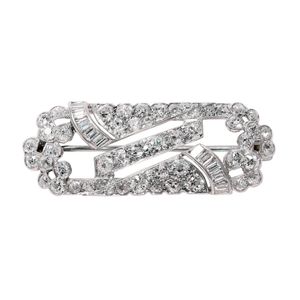1935 Diamond Brooch with 2.28 Carats of Old Mine-Cut Diamonds
Diamond brooch, circa 1935; the plaque of openwork design, accented with bead-set and bezel-set old mine-cut diamonds and channel-set baguette diamonds together weighing approximately 2.28 carats, mounted in platinum with a 9ct white gold brooch pin, length 38 mm, width 14 mm, total gross weight approximately 6 grams.
You must be a subscriber, and be logged in to view price and dealer details.
Subscribe Now to view actual auction price for this item
When you subscribe, you have the option of setting the currency in which to display prices to $Au, $US, $NZ or Stg.
This item has been sold, and the description, image and price are for reference purposes only.
- Openwork in Jewellery - Openwork, also known as pierced work, is a decorative technique used in jewellery making that involves removing or cutting out sections of metal from a piece of jewellery to create a pattern or design. This technique can be used in a wide range of jewellery styles, including necklaces, bracelets, earrings, and rings.
Openwork jewellery can be made using a variety of different techniques, including hand carving, sawing, and laser cutting. The design can be simple or complex, and can feature a range of different shapes and motifs, from delicate floral patterns to bold geometric designs.
One of the advantages of openwork jewellery is that it can add visual interest and depth to a piece without adding a lot of weight or bulk. This can be particularly appealing in larger pieces, such as necklaces and bracelets, where heavy materials can be uncomfortable to wear. - Circa - A Latin term meaning 'about', often used in the antique trade to give an approximate date for the piece, usually considered to be five years on either side of the circa year. Thus, circa 1900 means the piece was made about 1900, probably between 1895 and 1905. The expression is sometimes abbreviated to c.1900.
This item has been included into following indexes:
